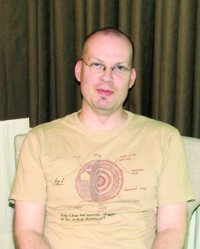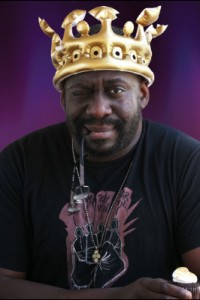David J. Schwartz: Cynics and Believers

David Schwartz was born in St. Paul MN. He attended the University of Wisconsin at Madison and earned a BA in Scandinavian Studies in 1998. He also has a Masters in Library Science from the University of Illinois at Champaign-Urbana. He lives in St. Paul.
Schwartz began publishing with “Thieves’ Justice” in Dragon (1994), but didn’t sell another story until 2001, with “The Comfort of Thunder” in On Spec. He has since published almost 30 stories in small-press magazines and anthologies, along with standalone novella The Sun Inside (2008). His first novel Superpowers (2008) was a finalist for the Nebula and Crawford awards.
Excerpts from the interview:
“I took a creative writing class in college, which was not a good experience. I was writing a novel that will probably never be published and trying to do short stories, but I was never a short story reader as a kid. I’ve been in various other writers’ groups, but when I went to the Odyssey Workshop in 1996, that really got me going.
“After Odyssey, I read a short story a day, trying to internalize the way they worked and giving myself a crash course in the subject. After a while, I finally started to feel like I was getting a handle on it. But I had been trying for so long to get into one of the Big Three magazines that I’d unconsciously begun to write into an F&SF box, and that was really destructive for me. I was trying too hard to anticipate what the editor might like. My first sale to Lady Churchill’s Rosebud Wristlet, “The Icthyomancer Writes His Friend with an Account of the Yeti’s Birthday Party”, was just this odd little thing that got into my head. I wrote it in a day or two and sent it to some friends, wondering, ‘Is this even a story?’
“When Gavin Grant and Kelly Link bought it, that gave me an immense kick. I hadn’t written that for anybody except me, and suddenly I was like, ‘Oh wow. This is how it works.’ It was an immense boost of confidence, and after that I started writing more from my own head without trying to live in somebody else’s.
“I decided I wasn’t going to worry about what type of thing I was writing, particularly with short fiction. I don’t want to be a person who says they don’t write genre, because I do write genre. But sometimes I feel like what I’m doing is writing regular fiction with genre elements — it’s either that, or I just don’t care about the labels.”
*
“I got the sense from the reviews that Superpowers is a book people either like or really hate. I think a big part of that is the fans coming from the comic book/superhero angle seem to want villains and fights, and they don’t want the interpersonal drama. And the fact that 9/11 takes place in the book gives some people a lot of problems, for various reasons.
“I deliberately set out to write a book about normal people who got superpowers. I wanted it to be the real world, and I wanted them to have normal problems that anybody could relate to. It was published as mainstream, but most of the attention and readership has come from the genre side. I don’t know how well it actually crossed over. On both sides, there was a little bit of confusion, with people not knowing quite what to make of it.
“I wanted to really ground it in the setting of Madison, Wisconsin and have a sense of place there. As for the challenge of dealing with 9/11, I hope this won’t sound arrogant, but I just didn’t want to be intimidated by that. I was getting ready to start a novel about superheroes when 9/11 happened, so I had to rethink everything in the context of that event. I felt that to write about power in a larger thematic way without addressing 9/11 would be a cheat. I had to say something about it.”
*
“There’s an argument for the comfort reading a lot of people do, reading what’s essentially the same fantasy novel over and over again, and I can understand that. If I just wrote about life precisely as I experienced it, there would be no point. Who wants to read that? Gene Wolfe said something years ago at the World Fantasy Convention in Minneapolis. He was on a panel talking about how the reason mainstream literature doesn’t work for some of us is that it doesn’t reflect the way we experience the world. That struck home for me. It’s not that I’m a terribly religious or mystical person, but I am mystified by the world; the world is, in many aspects, incomprehensible to me. And that’s the point of view I write from: this thing is something I cannot fully grasp, so I want to write around it and try and get a handle on it.
“It’s not that I’ve never written anything without genre elements. But in general that’s what I prefer — I have a genre head! Mainly fantasy. I like mythic ideas, but I like to undercut them, too. I was raised Catholic (in the ritual), and the longing for deeper meaning is something I still live with, but on the other hand I’m hugely skeptical of the religious impulse in myself and in anyone else.”
This interview and more like it in the October 2009 issue of Locus.
 While you are here, please take a moment to support Locus with a one-time or recurring donation. We rely on reader donations to keep the magazine and site going, and would like to keep the site paywall free, but WE NEED YOUR FINANCIAL SUPPORT to continue quality coverage of the science fiction and fantasy field.
While you are here, please take a moment to support Locus with a one-time or recurring donation. We rely on reader donations to keep the magazine and site going, and would like to keep the site paywall free, but WE NEED YOUR FINANCIAL SUPPORT to continue quality coverage of the science fiction and fantasy field.






